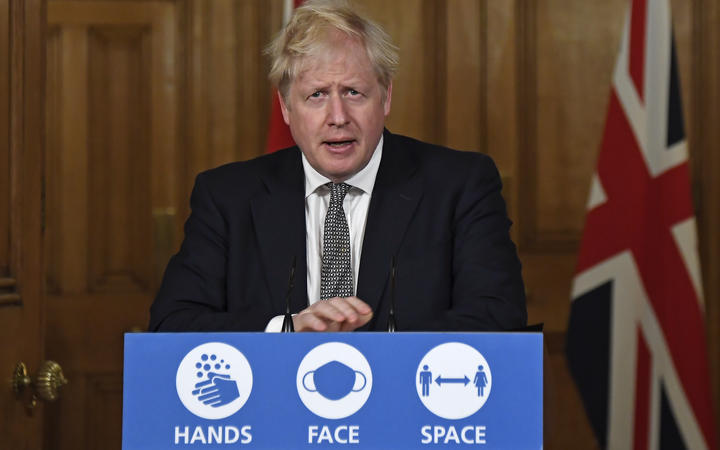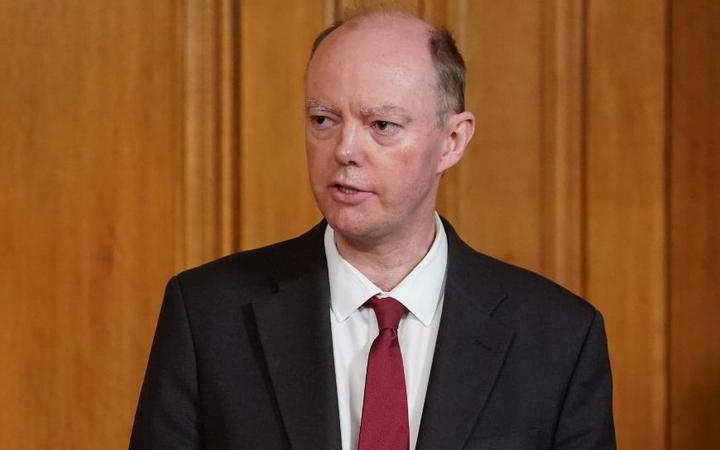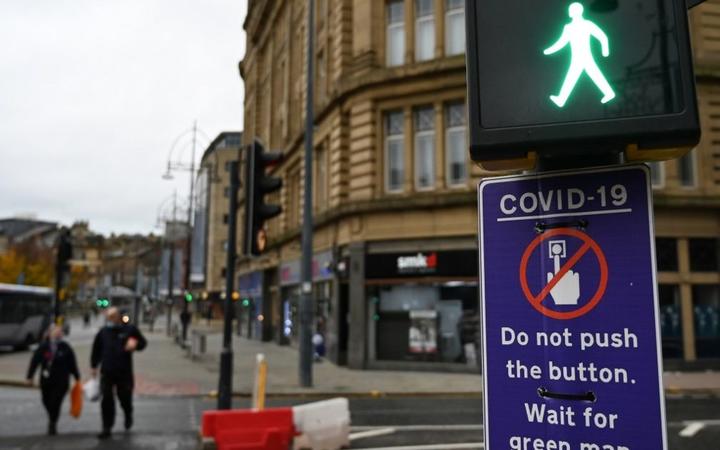Boris Johnson orders four-week Covid lockdown for England
Prime minister Boris Johnson has ordered England back into a national lockdown as the United Kingdom passed the milestone of one million Covid-19 cases and scientists warned the virus was spreading faster than their worst predictions.

UK Prime Minister Boris Johnson addresses a press conference in London to announce a new lockdown. Photo: AFP
The United Kingdom, which has the biggest official death toll in Europe from Covid-19, is grappling with more than 20,000 new coronavirus cases a day and scientists have warned the “worst case” scenario of 80,000 dead could be exceeded.
Over the past seven days, the UK has averaged almost 23,000 new cases a day, and 237 deaths.
Johnson told a media briefing at 10 Downing Street that “no responsible prime minister can ignore the message of those figures”.
He said: “No one wants to be imposing these kind of measures anywhere.”
He had hoped that with “strong local action” the government could get the rate of infection down in targeted areas.
But the virus was spreading “even faster than the reasonable worst case scenario” of scientific advisers.
The prime minister said the overrunning of the NHS would be a “moral disaster”.
Doctors and nurses would be “forced to choose which patients to treat… who would live and who would die,” he said.
The lockdown will start on Thursday and end on 2 December, Johnson said.
Takeaway outlets will be allowed to stay open but pubs, bars and restaurants will have to close, the prime minister said.
People will be allowed to leave home for: education, work, if they cannot work from home, exercise and recreation outdoors, medical reasons, to shop for food and essentials and to care for others.
Unlike the first national lockdown, schools, colleges and universities will be allowed to stay open.
“We cannot let this virus damage our children’s futures even more than it has already,” Johnson said.
He said the government will extend its emergency coronavirus wage subsidy scheme.
Parliament will debate and vote on the measures on Wednesday.
Christmas will be “perhaps very different” this year, Johnson said.
“But it’s my sincere hope and belief that by taking tough action now, we can allow families across the country to be together,” he added.
The prime minister also promised a massive expansion in the deployment of rapid turnaround coronavirus tests.
Cases rising rapidly
England’s chief medical officer Professor Chris Whitty said there was a “significant rate of increase” in virus cases across the entire country.
He said the prevalence of Covid has been going up “extremely rapidly” over the last few weeks” – having been “very flat” due to social distancing measures in the spring and summer.
Prof Whitty said England has “very little headroom” when it comes to the spread of the virus.
The virus was not being constrained to one age group, and was spreading into older age groups – people over the age of 60.
He added there was a rise in the number of hospital admissions in England in “virtually every age group in older adults”.
“If we do nothing, the inevitable result will be that these numbers will go up and they will eventually exceed the peak we saw in spring of this year.”

England’s chief medical officer Prof Chris Whitty Photo: AFP / UK government
Chief science adviser Sir Patrick Vallance told the media briefing that experts created scenarios on the assumption the R rate stays at one over the course of the winter.
“What is clear from all the scenarios is the potential for this to be twice as bad or more compared to the first wave.”
Before the news conference, the government said total confirmed Covid-19 cases had risen 21,915 in the past day to 1,011,660.
Johnson held a cabinet meeting yesterday after government scientists warned the outbreak was going in the wrong direction and that action was needed to halt the spread of the virus if families were to have any hope of gathering at Christmas.
Scotland, Wales and Northern Ireland run their own pandemic policies.
Johnson was criticised by political opponents for moving too slowly into the first national lockdown, which stretched from 23 March to 4 July. He fell ill with Covid in late March and was hospitalised in early April.

A warning sign for pedestrians in Bradford. Covid cases in England are rising at a faster pace than experts’ worst predictions. Photo: AFP
Europe locked down
The measures will bring England into alignment with France and Germany by imposing nationwide restrictions almost as severe as the ones that drove the global economy earlier this year into its deepest recession in generations.
A national lockdown would represent a dramatic change of policy for the prime minister, who has been saying for months that it will not be necessary.
Two weeks ago he defended his strategy of a patchwork of local restrictions by saying he wanted to avoid the “misery of a national lockdown”. Currently, areas of England are subject to one of three tiers of coronavirus restrictions.
The prime minister was hugely critical of labour for suggesting one. Several Conservative backbenchers are opposed to national measures.
Calum Semple, professor of outbreak medicine at the University of Liverpool and member of the government’s Scientific Advisory Group for Emergencies (SAGE), said the second wave of Covid-19 was a reality.
“And, unlike the first wave, where we had a national lockdown which protected huge swathes of society, this outbreak is now running riot across all age groups,” he told the BBC.
A new lockdown would heap more pressure on finance minister Rishi Sunak and the Bank of England to increase their already huge support for the UK economy, the world’s sixth-biggest. The economy slumped a record 20 percent in the spring and has been struggling to maintain its recovery.
So far the United Kingdom has reported 46,555 Covid-19 deaths – defined as those dying within 28 days of a positive test. A broader measure of those with Covid-19 on their death certificates puts the toll at 58,925.
– Reuters / BBC
